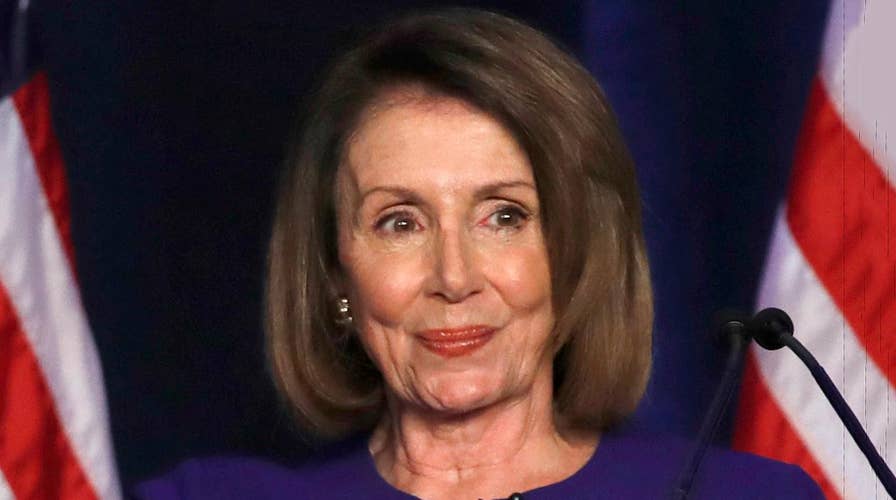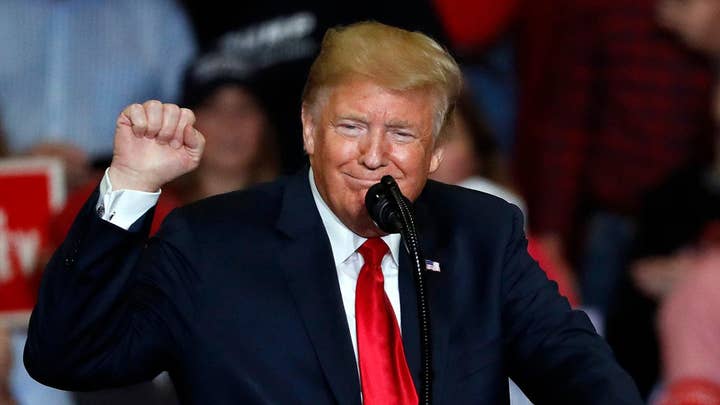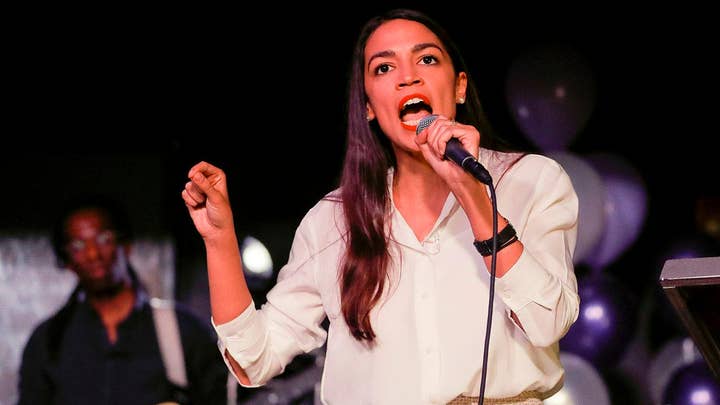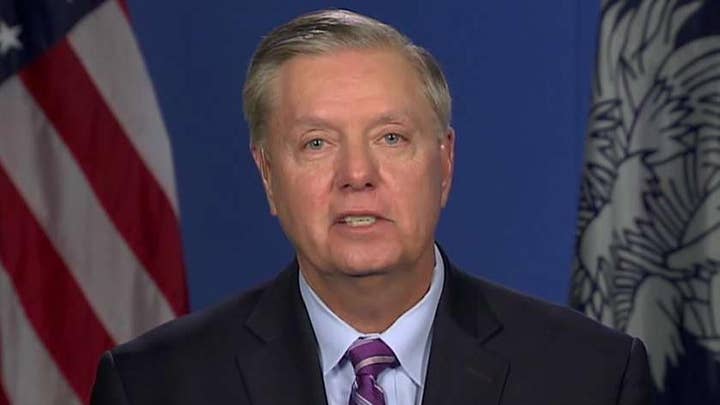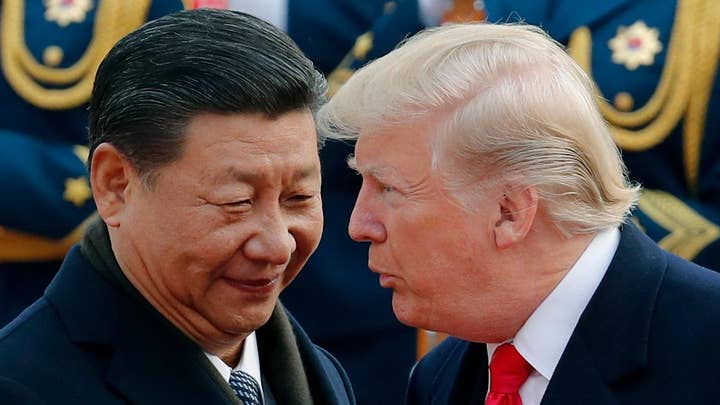Pelosi: Democratic Congress will honor Founders' vision
House Minority Leader Nancy Pelosi speaks after Democrats gain control of the House of Representatives.
After years in the political wilderness on Capitol Hill, Democrats will have the power to push their legislative agenda in Congress after winning the House majority Tuesday. But faced with a Republican-controlled Senate and White House, the Democrats are in for a series of showdowns that could leave the party undertaking more modest legislative goals on issues from prescription drug prices to infrastructure, while laying the groundwork for a more ambitious national agenda ahead of the 2020 presidential race.
Meanwhile, President Trump's wide-ranging wishlist, including his recently announced plan for a 10-percent middle-class tax cut and Senate Majority Leader Mitch McConnell's renewed call for an ObamaCare repeal, now requires significant revisions. Compromise between Democrats and Republicans will surely remain elusive as the midterm season is overtaken by presidential election politics, though analysts say both sides may be forced to strike some deals in pursuit of legislative wins.
Democrats' first major initiative will likely be to enact rules changes that govern the House, because those internal regulations do not require Senate passage. In the wake of the dramatic arrest of Rep. Chris Collins, R-N.Y., in August on insider trading charges related to his role on the board of a prominent biotechnology company, ethics reforms are set to be a marquee area of focus.
DEMS RETAKE HOUSE, BUT GOP EXPANDS SENATE MAJORITY -- GIVING THEM CONTROL OVER JUDICIAL APPOINTMENTS
Nancy Pelosi, D-Calif., who has her eyes on the speaker's gavel, signaled as much on Tuesday night, vowing that "we will have a Congress that is open transparent and accountable to the American people."
“Tomorrow will be a new day in America,” Pelosi declared. "It's about restoring the Constitution's checks and balances to the Trump administration. ... It's about ending wealthy special interests' free rein over Washington."
She promised to "clean up corruption to make Washington work for all Americans."
Pelosi similarly pledged to lead "the most ethical Congress in history" when she first rose to the speakership in 2007 -- a boast that became a liability when she placed then-Rep. William Jefferson on the Homeland Security Committee, despite allegations he had stashed $90,000 in bribe money in his freezer. (Jefferson was later convicted on bribery charges.)
"Members of Congress should not be sitting on boards of companies, especially those whose are impacted by policies — policy decisions and the government — so this is appalling, but it shows the brazenness of it all," Pelosi said on MSNBC earlier this year.
More substantive legislative changes are also possible on a series of high-profile policy items on which both parties have signaled they could ultimately have some common ground.
"The only legislative initiative that appears to be at stake is tax reform 2.0. Other than that, the same things happen."
In June, Trump supported a compromise immigration bill that would have secured $25 billion for border wall construction while also providing a pathway to citizenship for so-called Dreamers, or illegal immigrants brought to the U.S. as children. But after the legislation hit a wall of its own as moderate and conservative Republicans splintered, Trump seemingly withdrew that support and said his party should try again if a "red wave" materialized in November.
DEMS TO FLEX MUSCLE, AS HOUSE AFFORD THEM POWER TO SUBPOENA TRUMP ADMIN
Roosevelt University politics professor David Faris, who has said that the GOP likely wouldn't have made much legislative progress even it had retained control of the House, told Fox News that Trump might revisit that short-lived compromise effort in the coming months.
"If Democrats are willing to fund the border wall in exchange for the Dreamers -- I think that broad compromise has been there a long time," Faris said. "The real question is whether the president is willing to let go on restrictions on legal immigration. If he can let that go, I think the compromise is there."
Leaders from both parties have also publicly lamented soaring prescription drug costs. Trump has hammered Pfizer and other pharmaceutical giants on the issue, saying in July that they "should be ashamed that they have raised drug prices for no reason" and "are merely taking advantage of the poor."
The president has framed drug prices as an affront to his "America First" worldview, writing on Twitter that the companies are "giving bargain basement prices to other countries in Europe & elsewhere." Soon after his election, he charged that drug companies were "getting away with murder."
A 2015 Reuters study found that on average, prices for the world's top-20 highest selling medicines are three times more expensive in the U.S. than they are in Britain, owing to government pricing controls there.
On Tuesday, Pelosi promised to take action in brief remarks as early election returns poured in.
"Democrats will lower health care costs and prescription drug prices for seniors and families across America," she said. "Instead Mitch McConnell and the Republicans have put Medicare and Medicaid on the chopping block, and will continue their cruel assault from the protections for people with preexisting conditions.
But the issue of soaring drug prices may be trickier to resolve than it appears. Trump already signed a bipartisan bill in October that guaranteed pharmacists the right to tell consumers when paying cash would be cheaper than using insurance for their prescriptions, over the objection of insurance companies. And Democrats, although united in their concern over soaring prices, are split on how to resolve the underlying problem.
Some Democrats want to allow the federal government to negotiate Medicare drug prices, even though similar efforts in the past may have made the problem worse. On Tuesday night, Pelosi hinted at taking "very strong legislative action to negotiate down the price control of prescription drugs that is burdening seniors and families across America."
"I think it deserves some hearings, but it’s not as easy as it sounds. It’s not a magic bullet."
In 1990, Congress mandated that federal Medicaid programs either receive a 15 percent discount on drugs off their list prices, or the most competitive price offered to private payers -- an initiative that ultimately led drug companies to slash private discounts to roughly 15 percent off list prices.
But some in her party are skeptical. “It’s a great talking point,” Rep. Scott Peters, D-Calif., told Roll Call, referring to the idea of having the federal government negotiate with drug companies. “I think it deserves some hearings, but it’s not as easy as it sounds. It’s not a magic bullet.”
Infrastructure reform could also be an area of bipartisan consensus, as Democrats have vowed to use the committee process to build agreement on any proposal to improve the nation's roads, bridges, sewer systems, and schools.
On Tuesday, Pelosi specifically touted her plans to "deliver a transformational investment in America's infrastructure," including broadband networks, housing, schools, and sewers.
"Infrastructure has never been partisan," she claimed.
In October, Trump signed a bipartisan bill to provide several billions of dollars to fund drinking-water initiatives and Army Corps of Engineers projects, just one day after he signed a similarly bipartisan bill to combat the opioid epidemic and just two months after he signed a massive defense spending bill into law.
"If you want to know about bipartisan accomplishments, look no further than this Congress," Stephanie Penn, press secretary for Senate Majority Leader Mitch McConnell, R-Ky., told Fox News. "Water infrastructure, opioids, defense, etc. All passed with overwhelming bipartisan support."
Trump's own infrastructure proposal, which called for a $200 billion federal investment in the hopes of spurring $1.5 trillion in additional funding from states and private investors, stalled in Congress earlier this year. Democrats balked at further spending cuts to pay for the measue, and instead suggested rolling back the GOP's recent tax overhaul. Republicans, meanwhile, split on whether to fund the plan with a gas tax or other mechanism.
RED-STATE DEMS WHO OPPOSED KAVANAUGH DROP LIKE FLIES IN MIDTERMS
Another potential showdown looms over Trump's recently renegotiated trade agreement with Mexico and Canada, which is slated to replace the North American Free Trade Agreement (NAFTA). The new United States-Mexico-Canada Agreement (USMCA) secures greater U.S. access to Canadian dairy markets and changes regulations to bring back more auto manufacturing to the U.S. and is considered one of the White House's crowning foreign policy achievements -- but it requires congressional authorization.
"The bar for supporting a new NAFTA will be high,” Rep. Richard Neal, D-Mass., who is poised to become the chairman of the House Ways and Means Committee, told Politico. And Trump himself has similarly sounded a note of caution: "Anything you submit to Congress is trouble," he said.
But other analysts have warned that Democrats, by fighting Trump on trade, would risk drawing attention to his accomplishments -- and play into his critiques that they are only interested in obstruction. One of the only major concessions by the U.S. in the USMCA is that it preserves a tariff-dispute regulatory regime that Canada had insisted was a sine qua non.
"Given the modest nature of the revisions he pursued with these trade agreements, I don't see Democrats dying on that hill," Faris told Fox News. "I think the opinion within Congress is broadly supportive of these agreements. ... You could argue that's an area where the president has succeeded, and I don't think Democrats want to highlight that success by trying to stop it."
Still, Faris added, if Trump decides to escalate the ongoing trade conflict with China, a congressional clash could be imminent.
"The collision course possible here is with China," Faris said. "If we get to the point where we're talking aboutmost-favored-nation status, I could see a potentially significant battle with Congress over that." (The U.S. has afforded China permanent normal trade relations since 2000, an arrangement that afforded China the same trade advantages as other countries with that designation.)
While more partisan fireworks are likely in the next two years, Faris said, the actual impact of divided government may not be as significant as it might appear, owing to the lack of pending, articulated GOP policy proposals that actually hang in the balance.
Douglas Holtz-Eakin, who previously directed the Congressional Budget Office and now heads the conservative American Action Forum think tank, agreed, telling Fox News that the Democratic takeover of the House won't actually "change much."
"The only legislative initiative that appears to be at stake is tax reform 2.0," Holtz-Eaken said. "Other than that, the same things happen -- with [Democrats] doing a lot more oversight."








































